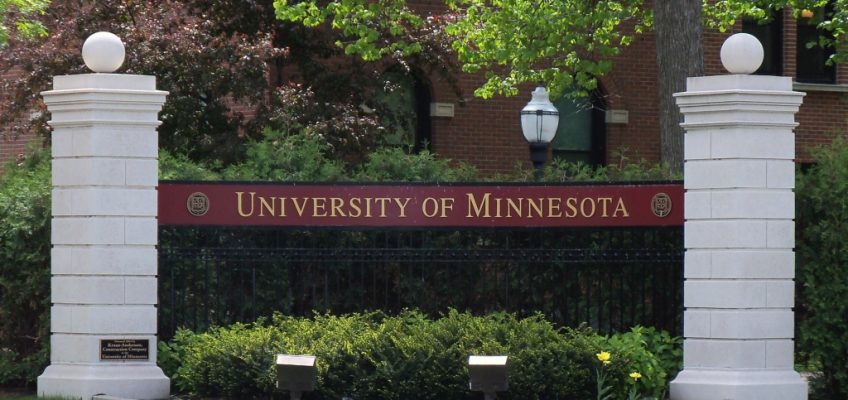The collections of the Minnesota Historical Society include more than 250,000 objects.
A new gallery that opened Wednesday is highlighting 25 of those objects as a kind of sampler.
The public is invited to view “The Stories We Keep: 25 Objects from MNHS,” the inaugural exhibit in the History Center’s new Collections Gallery.
Putting these objects on display — and sharing the stories behind them — is part of an effort by the St. Paul-based Historical Society to illustrate the breadth and depth of its collections, which of course go beyond objects to also include manuscripts, oral histories, audio and video recordings and more.
“This is part of a larger initiative to provide access to our collections,” says Christine Jones, senior director of experience development, of the new exhibit.
Here are five of the 25 objects on display through August:
A kayak of milk cartons
The new exhibit was inspired by a challenge the curators took up for the 175th anniversary of the Historical Society, when five curators were asked to choose five objects that reflected the “breadth, depth, diversity and surprise of Minnesota history and all of its people,” drawn from MNHS’s collections.
Their picks — including a dress fashioned out of butter cartons — appeared in the Winter 2024-25 edition of Minnesota History magazine, but the dress wasn’t available for this exhibit: It’s currently on loan to the Renwick Gallery of the Smithsonian American Art Museum for an exhibit called “State Fairs: Growing American Craft.”
But, local curators found a replacement with this milk-carton kayak.
“So this was built for the first Minneapolis Aquatennial milk carton boat race in 1971 and it was raced every summer until 1977 and then the maker, David Garron, put it in his garage,” says Jennifer Huebscher, curator of photography and moving images. “It did have a second life when his son cleaned it up and raced it in the 2001 race (and it won).”
This kayak illustrates dairy history through logos and slogans (“Every body needs milk”) as well as other familiar logos (from Dairy Queen to the Target Bullseye).
F. Scott Fitzgerald’s letter
A young F. Scott Fitzgerald’s letter to the St. Paul Public Library in 1919, responding to a query about his published works, is one of 25 objects featured in “The Stories We Keep: 25 Objects from MNHS.” (Courtesy of the Minnesota Historical Society)
Not many Minnesotans would be surprised to see a copy of “The Great Gatsby” on display at the Minnesota History Center, as it was written by our hometown great, the late F. Scott Fitzgerald, who lived and played among the mansions of Summit Avenue.
So the curators dug a little deeper into the collections and found a letter that was written earlier in Fitzgerald’s career.
“So in this particular letter, he wrote to Dawson Lobuston of the St. Paul Public Library, this was in 1919, and he’s confessing, ‘I haven’t really gotten any writings yet except my book, which is to be published,’” says Huebscher.
“That book was ‘This Side of Paradise,’ which was Fitzgerald’s first novel,” Huebscher says.
That novel, a classic in American literature, was first published in the spring of 1920.
The staff at his local library must have seen that Fitzgerald’s star was rising.
“In this letter that’s on view, he’s indicating that he’s following up on Lubuston’s request for a list of published works, likely for consideration for the library,” Huebscher says. “So there weren’t any major publications at that time, but the fact that he’s reaching out to Fitzgerald as a local talent and that Fitzgerald was happy to engage, we’re seeing kind of an early look at Fitzgerald and how folks locally interacted with him and responded to his talent.”
Dakota-language hymnal
The colorful, beaded cover to a Dakota-language hymnal features elements of Ojibwe and Cree beadwork styles. (Courtesy of the Minnesota Historical Society)
Some objects come with a bit of mystery, like this hymnal cover.
“We don’t specifically know who created this particular hymnal cover because, for things like this, you did not sign it,” Huebscher says.
Here’s what we do know: The colorful, beaded cover to a Dakota-language hymnal features elements of Ojibwe and Cree beadwork styles.
“A lot of Native women used these church-sponsored spaces, these women’s gatherings, to build and reinforce community ties and it’s surmised that this book cover might have been made in one of these groups,” says Huebscher.
“And what’s really great in the exhibit is that this piece is displayed next to the Minnesota Wild hockey mask that was featured in 2023 at the Minnesota Wild’s Native American Heritage Night. That mask was designed by Mdewakanton Dakota artist Cole Redhorse Taylor. And so you’ve got these floral motifs on both items that highlight a lot of Native crafts and using their art to make things beautiful and meaningful.”
Prince’s purple fabric
Through one of her binders, Marliss Jensen, a master dyer, shares the story behind Prince’s signature shade of purple. (Courtesy of the Minnesota Historical Society)
Prince didn’t work alone. It took people behind the late pop star to help him become as “Prince” as possible.
Marliss Jensen, for example, with her binders of fabric samples. One of those binders is now on display.
“It’s a costume binder — and we actually have several of them in the collection — and they come from Marliss Jensen,” Huebscher says. “She worked and lived in Minneapolis, she’s a master fabric dyer, she’d work with her clients, including Prince, to find the perfect shade of colors for costumes. And so for his stage costumes, particularly ‘Purple Rain’ but he used her for numerous costumes, they worked together to find the perfect shade of purple.”
“Purple Rain,” now a musical, started out as Prince’s album and movie in the 1980s. Prince, who died in 2016, grew up in Minneapolis and lived and worked at Paisley Park in Chanhassen.
The fabric tells a story.
“So what we have on display is one of those books and in it you’ll see fabric samples and notes that Marliss Jensen made — what the fabric was made of, what it’s going to be used for — and so you can really follow how these costumes were pieced together,” she says. “It’s really neat because while everyone knows Prince, it’s interesting to see him through the angle of a Minnesotan who worked on his costumes.”
Rondo joy
Over a five-year period in the 1960s, Earl McGee took thousands of images of St. Paul’s Rondo neighborhood. (Courtesy of the Minnesota Historical Society)
Earl McGee, a photographer, educator and civil rights leader, lived and worked in the Rondo neighborhood of St. Paul.
His photos of everyday life in Rondo in the 1960s are displayed via a binder and some of the photo contact sheets.
“He took thousand of photos in the area and some were for fun — he enjoyed perfecting his craft, trying out different angles … but he also photographed so many events: civic clubs, the Queen of Hearts ball, formal black tie events, activities at the Hallie Q. Brown Community Center where he worked for awhile, he was director of their education division and he was secretary of the Camera Club,” Huebscher says.
“So he photographed youth sports, neighborhood gatherings, parties, businesses, civil rights activities between 1961 and 1966, around the time that Rondo was being razed for the freeway construction and at the height of the Civil Rights movement as well, so that gives him special significance when you think of the Rondo community and being photographed by an active member of the community and really focusing on joy makes this collection special.”
For info on the exhibit, go to mnhs.org/historycenter/activities/museum/the-stories-we-keep.
In new Stillwater ‘micro-residency,’ public artists explore community and memory
Tattoo artists trained in Stillwater prison find work, community at White Bear Lake studio
Artist Dyani White Hawk finds affinity between Native, Western abstraction
New Walker Art Center exhibit brings sculptures inside the building
A roundup of Halloween events in the Twin Cities




